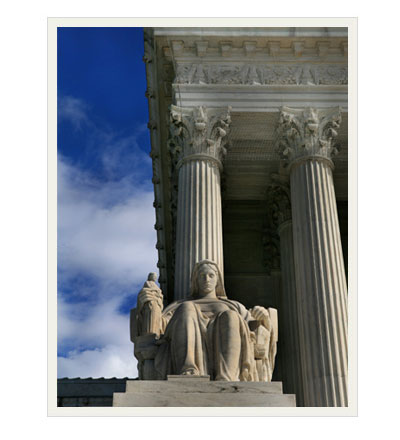|
Winter 2013
IN THIS ISSUE
d&G Lawyer News
Visit Our Site:

101 E. Kennedy Blvd.,
Suite 2000
Tampa, FL 33602
813-229-2775
|

Taking a "PCA" to the U.S. Supreme Court
By: Michael R. Bray
The trial court erred. You are certain of it. You put your heart and soul into the appeal, believing that the district court of appeal would surely see the error and correct it. After months of waiting, however, the court issues the dreaded "per curiam affirmed" decision, also known as a "PCA." Your client loses, and you don't even have an explanation to show for it. You file a motion for rehearing, clarification, and/or to certify conflict, but that is denied, too. What now?
 You clearly cannot appeal to the Florida Supreme Court. According to the Florida Constitution,
the Florida Supreme Court has discretionary review over appeals from district court of appeal decisions
only if they “expressly and directly” conflict with other district court or Florida Supreme Court decisions, expressly declare a statute valid, expressly construe the constitution, or expressly affect a class of state officers. Fla. Const. Art. V, § 3(b)(3). Because a PCA does not say anything at all, the Florida Supreme Court lacks jurisdiction to consider petitions seeking review of a PCA. See, e.g, Jenkins v. State, 385 So.2d 1356, 1359 (Fla. 1980).
You clearly cannot appeal to the Florida Supreme Court. According to the Florida Constitution,
the Florida Supreme Court has discretionary review over appeals from district court of appeal decisions
only if they “expressly and directly” conflict with other district court or Florida Supreme Court decisions, expressly declare a statute valid, expressly construe the constitution, or expressly affect a class of state officers. Fla. Const. Art. V, § 3(b)(3). Because a PCA does not say anything at all, the Florida Supreme Court lacks jurisdiction to consider petitions seeking review of a PCA. See, e.g, Jenkins v. State, 385 So.2d 1356, 1359 (Fla. 1980).
Don't despair, though. Your case might not be dead yet. There might be one other option, but it is definitely a long shot.
You might consider a petition for certiorari review in the U.S. Supreme Court. Unlike the Florida Supreme Court, the U.S. Supreme Court can and does review state court decisions, even if they are issued without opinion. See, e.g., Hobbie v. Unemployment Appeals Commission of Florida, 480 U.S. 136 (1987) (reversing Florida 5th DCA's per curiam affirmance). Because the Florida Supreme Court does not have jurisdiction to consider petitions seeking review of a PCA, an appellant does not have to go through the motions of attempting a futile appeal to that court. See, Florida Star v. B.J.F., 530 So. 2d 286, 288 n.3 (Fla. 1988) (Florida Supreme Court "does not, however, have subject-matter jurisdiction over a district court opinion that fails to expressly address a question of law, such as opinions issued without opinion or citation. Thus, a district court decision rendered without opinion or citation constitutes a decision from the highest state court empowered to hear the cause, and appeal may be taken directly to the United States Supreme Court.”).
Before you start drafting a petition, you should know that the U.S. Supreme Court will not accept a case that presents only issues of state law. See, Michigan v. Long, 463 U.S. 1032, 1040–1041 (1983). To get into the U.S. Supreme Court, your case must involve an issue of federal law or an issue concerning the U.S. Constitution. See, Art. III, U.S. Constitution. Also, the importance of your issue should reach beyond your client. Any petition seeking review in the U.S. Supreme Court is a long shot in the first place, as the Court generally grants review in approximately 4% of paid cases. See, e.g., Supreme Court October 2011 Statistics, at http://www.supremecourt.gov/orders/journal/jnl11.pdf. Accordingly, issues of great public importance with far reaching implications are more likely to get the Court's attention than an isolated or rare issue that just impacts your client or a small group.
If you decide that you have an issue over which the U.S. Supreme Court has jurisdiction, and that your issue is important enough to garner that Court's attention, you have 90 days from the date of the PCA, or if a motion for rehearing was timely filed, from the date that motion was denied, to file a petition seeking certiorari review in the U.S. Supreme Court. See, Supreme Court Rule 13. The applicable procedural rules can be found at http://www.supremecourt.gov/ctrules/2013RulesoftheCourt.pdf.
de la Parte & Gilbert has extensive experience in handing appeals and extraordinary writs in state and federal courts. If we can be of service, please email David Caldevilla (dcaldevilla@dgfirm.com) or Michael Bray (mbray@dgfirm.com), or call us at 813-229-2775.
|



